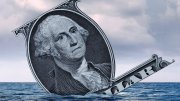As the world learned in the first hundred days of the second Donald Trump presidency, U.S. economic policy can be destabilizing—dramatically so—with severe consequences around the globe. That unfortunately makes Our Dollar, Your Problem: An Insider’s View of Seven Turbulent Decades of Global Finance, and the Road Ahead (Yale, $35), by Kenneth Rogoff, Boas professor of economics, especially pertinent. Whether or not you like to read about such matters, the former chief economist of the International Monetary Fund makes the subject accessible, and it may lend a useful perspective to your own financial strategies. From the preface:
It is true that the dollar has remained on top even though the United States has repeatedly been the epicenter of worldwide crises and recessions. Indeed, the 2008-2009 global financial crisis, much like the Great Depression of the 1930s, had its roots in U.S. policy blunders, yet it was the rest of the world that suffered the most. Ironically, the U.S. dollar emerged from that episode more dominant than ever. Don’t count on that happening again, especially given U.S. political dysfunction and debt problems and China’s zeal to break away from the dollar bloc. Although the dollar will likely stay on top for some time to come, its global footprint may shrink after decades of continual expansion; if so, the shift could further exacerbate the difficult financial adjustment the United States already faces.
If the United States wants to keep the dollar from dropping into a lower orbit, and encourage adherence to dollar rule, Americans need to appreciate that the rest of the world, even our friends, have mixed feeling[s] about U.S. hegemony.…
The United States’ allies and competitors alike enjoy the convenience of a quasi-global currency, much as English provides the common language of international trade and diplomacy. They bristle, however, at how exposed their economies are to the vicissitudes of self-absorbed U.S. macroeconomic policy. American financial officials typically pay little more than lip service to foreign concerns….Looking at the periodic financial turmoil of the past seventy-five years and the extreme divisiveness of the U.S. political situation today, not to mention the rise of China, the rest of the world is right to worry about what all of this implies for global macroeconomic stability in the coming decades.









